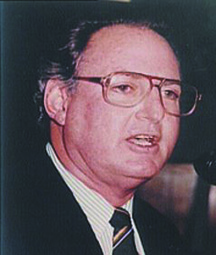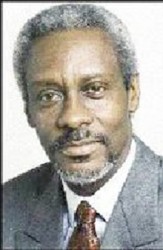By Tony Cozier
Just as two prime ministers were meeting with the main characters in Port-of-Spain on Friday in an effort to find a settlement to yet another of the several recent challenges that have destabilised West Indies cricket, an e-mail popped up on the computer inbox of West Indies Cricket Board (WICB) president Dave Cameron.
It was not unexpected; it was chilling all the same. It was from Sanjay Patel, secretary of the Board of Control for Cricket in India (BCCI), confirming earlier notice that it would seek compensation for the losses it suffered from the team’s premature pullout of its tour of India after the fourth ODI on October 17.
Patel itemized, “in plain economic terms”, the areas accounting for an overall claim of US$47.2 million; among them were broadcasting rights fees,


title and team sponsorship and ticket sales. He gave the WICB 15 days to “formally inform the BCCI, in writing, of the steps it intends to take” to meet the claim otherwise it would take legal action in India.
As he indicated in previous statements, Patel left no doubt over where the BCCI placed the responsibility for the termination. It was on the WICB and, more specifically, president Cameron.
He noted that it was only through his own approach to the players that the first ODI went ahead; the intervention of “high-ranking BCCI officials” ensured the next three matches were played.
“Finally, after the fourth ODI at Dharamshala on October 17, you pulled out your team and communicated your decision to cancel the remainder of the tour,” he declared.
The terminology is pertinent; it wasn’t that the players withdrew but that Cameron, fiddling on the other side of the globe while the flames were engulfing the tour, pulled them out.
“The adverse financial ramifications and the negative impact of your action to unilaterally cancel the remainder of the tour was well within your understanding, yet you still went ahead and cancelled the tour in complete disregard of your legal commitments,” Patel added for good measure.
It was an issue simultaneously occupying the attention of prime ministers Ralph Gonsalves of St. Vincent and the Grenadines and Keith Mitchell of Grenada, Cameron, Dwayne Bravo, West Indies ODI captain and spokesman for the players in India, and Ralph Thorne, the players’ lawyer.
Wavell Hinds, president the West Indies Players Association (WIPA) whose signing of a new Memorandum of Understanding/Collective Bargaining Agreement (MoU/CBA) with the board was vehemently rejected by Bravo and his men, was said to have been involved through Skype.
There were reliable reports yesterday that agreement was reached that the new MoU/CBA would be renegotiated; a time frame was not given. In the interim, all the players would be available for selection for the December 10-January 28 tour of South Africa and the February 14-March 26 World Cup in Australia and New Zealand.
In addition, Sir David Simmons, former Chief Justice and Attorney General of Barbados, would head the task force, established at the WICB emergency directors’ meeting in Barbados as far back as October 14, to examine all aspects of the fiasco in India. It would include Rev. Sir Wes Hall, the iconic fast bowler of the 1960s, himself a former WICB president.
In the circumstances, as encouraging as it was, such decisions seemed immaterial.
For an organization warned by the chartered accountants, KPMG, in its 2012-13 financial statement that its net loss of US$5,821,413 for the previous year, along with shareholders’ deficiencies of US$5,693,323, “raise substantial doubt that the company will be able to continue as a going concern”, it was clear that US$47.2 would be way beyond the WICB’s ability to pay.
So what next?
Dr.Rudi Webster, a Barbadian now resident in Grenada, has been close to the game all his life. He is a former fast bowler for Scotland, Warwickshire and Otago, has been psychologist to West Indies teams and was West Indies manager in Kerry Packer’s World Series Cricket.
He has suggested what seems to me the most sensible way forward. It was echoed in a separate conversation yesterday with Edward Ince, a prominent businessman in Barbados and a one-time club mate of mine.
“If the board resolves the crisis, it should immediately commit itself to a structural adjustment programme, somewhat similar to those designed by the International Monetary Fund (IMF) for countries that are performing poorly and experiencing serious financial, organizational and leadership problems,” Dr.Webster wrote last week. “Failure to do so will result in a repetition of the behavior patterns that have plagued West Indies cricket for years.”
With its connotations of neo-colonialism, the IMF is not readily embraced by Caribbean governments. Yet its strategies have been successful for some, most recently Jamaica; others simply listen to their advice and implement their own home-grown plans.
Ince would change IMF to ICC. The governing body for world cricket would act as caretaker for the WICB over the next two years, ensuring that proper governance is maintained.
The ICC was reconstituted last January, giving Australia, India and England the paramount positions. The comment of chairman of Cricket Australia, Wally Edwards, prior to its meeting in Dubai next week, that he couldn’t imagine West Indies being lost to the game presented a glimmer of hope for the WICB.
“I think there’s a genuine desire at the ICC meeting next week to get things back on track,” he said. “In the past, you’d talk about these things but you could never resolve anything…because they were factions all around the table and it was very difficult to have good quality debates to make a decision”. In other words, much like the WICB.
“We now have a fully functioning board and it’s well led,” he added. In other words, the antithesis of the WICB.
There are, of course, a couple of reports on the subject of governance gathering dust somewhere in the WICB offices in Antigua without their main points implemented.
There is no more appropriate time to revive the weighty report presented by former Jamaica Prime Minister P.J.Patterson and his committee in 2007 and to have another look at Kittian Queen’s Counsel Charles Wilkin’s recommendations that were rejected out of hand last year.
Dr. Webster cautions of the consequences should the status quo be allowed to remain after the cleaning up of the latest mess.
“There is no guarantee that these steps will be taken because, unlike democratic countries, the board is not accountable to the people or any authority and can very well do as it pleases,” he wrote.
Doing as it pleases has caused West Indies cricket the embarrassment, and the losses, from three previous strikes and repeated standoffs with leading players.







